2016 Boating Industry Bold Moves
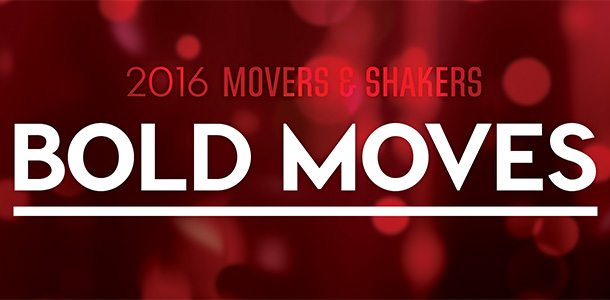
We profiled our four 2016 Movers & Shakers, but there are several other industry leaders working to improve boating.
The six leaders on the following pages are also making bold moves to advance boating by improving technology, rebuilding iconic brands and raising the professionalism of the entire industry.
Fuel solutions
Bill Brackney
Manager, Product Engineering and Development, Moeller Marine Products
Sparta, Tenn.
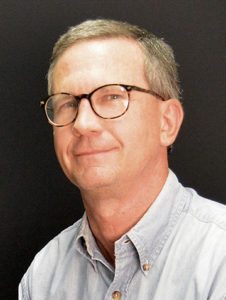
When the Environmental Protection Agency finalized a series of regulations for evaporative emissions for the marine industry in 2009, it meant a big change for boat manufacturers and the industry as a whole.
And for fuel tank manufacturer Moeller Marine Products, that meant a new level of responsibility as it worked to help its builder partners prepare for the change. Several innovations from Moeller, under the leadership of Bill Brackney, have helped manufacturers meet those demands over the last several years.
In 2011, the company introduced its poly diurnal tanks to meet the barrier and fuel permeation requirements, but since then several other innovations have furthered its offerings:
• Redi-Tanks – Instead of a custom tank like Moeller’s typical offerings, this off-the-shelf solution gives smaller builders an easy tank solution.
• Internal venting – By changing the potential location for vents, this option gave boat builders more design flexibility.
• Aluminum tanks – As a polymer tank maker, Moeller had looked at aluminum tanks as competitors, but the team realized two things: they were already welding aluminum to make their molds and there were customers that were never going to want a poly tank. This addition helps reach those customers.
• Diurnal components – Since the introduction of diurnal tanks in 2011, the components have not come down in price, so Moeller decided to develop its own components, resulting in cost savings for its customers.
But what truly sets Moeller apart is its dedication to being a resource for its customers.
“We sell Moeller on the fact that we are a full-service provider,” Brackney said. “We want to offer great service and great customer satisfaction.”
Earlier this year, Moeller launched its TIP Talk, a semi-monthly newsletter that offers technical and practical information on fuel systems.
Brackney’s team also now offers full-service engineering design and consulting.
“We want to be able to service and provide … a one-stop shop for our customers,” Brackney said. “We design the tank, we design the location of the components, we get the tip study out, we can turn it faster, with greater customer satisfaction.”
Growing markets
Steve Hashim
Asia & Middle East Sales Manager, Malibu Boats
Bangkok, Thailand
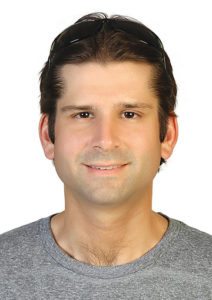
To grow the boating industry, smart manufacturers need to find new markets both in the United States and overseas.
Malibu identified Asia as a market for great potential growth and in 2013 Steve Hashim was tasked with developing the market. In just a few short years he has helped grow sales there by more than 300 percent, increasing Malibu’s market share from 7 percent to more than 50 percent of the tow boat market.
A big part of Hashim’s job has been to introduce water sports to a region that is relatively unfamiliar with the activities and lifestyle compared to the American market.
“Asia is important for Malibu because there is an opportunity for water sports to grow in the region,” Hashim said. “Water sports being a relatively new activity in the region, and the idea is that if water sports can be as popular as it is in the U.S., then why not other places, such as Asia?”
Still, that lack of knowledge about the sport can be a challenge.
“I think the theme that water sports is quite new relative to the U.S. is pretty consistent,” he said. “Therefore it’s going to take time and a bit of patience. And it’s not a sure thing. Also, we have some good competition so we have to work hard.”
To generate interest in the sport, Malibu has focused on producing events throughout the region, such as the Malibu Tokyo Pro in Japan and Malibu Seoul Pro in South Korea. Those two countries have so far been the strongest markets for Malibu.
“By bringing some of the best wakeboarders in the world to these locations, this obviously creates some visibility,” Hashim said. “This provides some exposure not only for Malibu, but water sports in general, which helps with introducing to people. Otherwise we like Southeast Asia, because of the good climate, tourism, etc.”
From a product standpoint, thus far consumers there seem to be choosing similar products to those that are popular in the U.S. market, but it’s probably too early to say what the trends will be.
“I think due to the early stage, it’s going to take some time for the product mix to truly define itself,” Hashim said. “It’s case by case at the moment. Malibu has an excellent, wide ranging product mix offering, which I think is helpful and offers some flexibility.”
So far, the early results have been encouraging, as demonstrated by the large market share gains and sales growth.
“Until about two years ago we hadn’t really had a presence in Asia,” Hashim said. “By getting some boats out there and allowing people to get in the boats, they can see for themselves and make the right choice.”
Streamlining service
Kevin Hutchinson
Founder/CEO, MyTaskit
West Palm Beach, Fla.
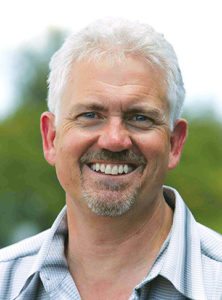
The service department is the bread and butter of boating. It’s a chance to touch customers on a regular basis, and a recurring source of income when sales dry up. Plus, without a good service experience, boaters leave the pastime and never come back.
Despite that, it is still a relatively low-tech operation for many companies. MyTaskit’s goal is to change that by introducing technology and reducing paperwork in the service pipeline.
With all the communication within companies and with subcontractors, there are a lot of inefficiencies that can be addressed and improved upon, said Kevin Hutchinson, MyTaskit founder and CEO.
“There’s a ton of paperwork, radio calls, text messaging, emails – all that stuff that goes back and forth [as they] try to coordinate their priorities, the work they should be doing, what boats they should be working on,” he said. “We have all that stuff going back and forth, none of it coordinated.”
The company had started with The Boat Village, essentially a social media network that was consumer-focused, and coordinating communication between consumers and service operations.
What Hutchinson and his team learned is that there was a bigger need in the industry to focus on internal communication first.
“The businesses wanted to start with their own enterprise because the need was greater there,” Hutchinson said. “It was really the industry that pushed us to first coordinate better service internally and coordinate better service with subcontractors.”
The 2014 acquisition of Dockmaster cleared the way for the rebranding of the business as MyTaskit in 2015, launching the company on a growth trajectory.
The coordination module of MyTaskit has grown its service pro user base by more than 500 percent this year and the number of registered boat owners has more than doubled.
“Anyone who’s a task-oriented business needs this platform,” Hutchinson said. “We just have to follow the market. Once we turned our attention to that we really saw a dramatic growth in our user base.”
Century comeback
Bryan Lucius
President, Century Boats
Zephyrhills, Fla.
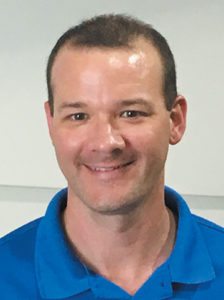
Relaunching a shuttered boat brand may not have seemed like the best decision in 2011. The recession had left the industry battered, with manufacturers, dealers and suppliers disappearing at an unprecedented rate.
But that was exactly what Bryan Lucius and his family decided to do, purchasing Century Boats from Yamaha Marine, which had shut down production in December 2009.
“At that time, it wasn’t this slam-dunk decision,” said Lucius, now the company president. “There was certainly a lot of soul searching and debating on do we do it, do we not do it. Market conditions certainly weren’t telling you to do it. It just felt like Century had such a powerful brand and name … that it kept drawing all of us to it.”
Now, in 2016, the company is celebrating its 90th anniversary and recently announced its first expansion to the model line, the 24 Resorter. The new dual-console Resorter brings back a hallowed name from Century’s past.
Lucius had been building skiffs and bay boats since 2004 under the All Craft Marine name. The company had been packaging with Yamaha and those relationships helped smooth the acquisition.
The heritage of the brand and owner loyalty made the brand an attractive target.
“It wasn’t as though Century went bankrupt. It was just a strategic shutdown,” Lucius said. “There was no ill toward the brand. It was more of a mourning that it wasn’t around.”
After moving 66 trailer loads of molds and equipment from Panama City to the Zephyrhills facility, the biggest challenge has been rebuilding the dealer network and showing that Century could maintain the quality for which the brand was known.
Century’s production peaked at more than 1,000 boats a year in the mid-2000s. Current production is about 12 boats a month. Lucius said they company will continue to grow, but the management team doesn’t plan to reach the levels of the Yamaha era.
“We’ve always said it has to be controlled growth,” he said. “That’s what we’re trying to manage and not overbuild. Century has a very high ceiling. We just need to manage it do it doesn’t get away from us.”
Raising professionalism
Vin Petrella
Executive Director, YBAA – The Association of Yacht Professionals
Annapolis, Md.
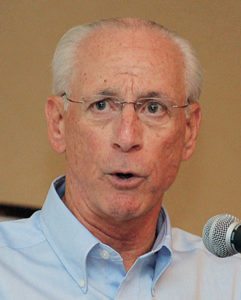
At YBAA, a big part of the job is making sure that those who sell yachts have a resource and an advocate for professionalism.
“One of the things we’ve tried to always do is make sure we are sort of self-policing when it comes to the level of professionalism and ethical behavior of our members and yacht brokers,” said Executive Director Vin Petrella. “It all comes back down to the consumer. We were very concerned many, many years ago that the reputation yacht brokers had with consumers was not necessarily a good one.”
With California and Florida as the only states that require licensing, the YBAA took it upon itself to create a certification, the Certified Professional Yacht Broker, which Petrella helped develop as a volunteer leader in 1999.
That reputation challenge is why YBAA made a conscious move to get away from the term yacht broker, instead preferring yacht sales professional. Brokers had a “used car salesman” reputation to many consumers, Petrella said.
As a yacht sales professional for more than 35 years before taking over as executive director of YBAA in 2010, Petrella knows those challenges faced by his members on a day-to-day basis.
Under Petrella’s leadership, the YBAA has also become more engaged with the rest of the recreational boating industry through his participation in American Boating Congress and the Recreational Boating Leadership Council.
“One of the things that I brought to my peers in the industry is that awareness that we’ve got to be involved in all the issues that affect the recreational marine industry,” he said.
One of those key issues is the need to bring more diversity into the yacht market, not only as buyers, but also as salespeople.
“We have to do that to support to promote the effort of Grow Boating in terms of them trying to attract a more diverse group,” Petrella said.
An important element to that plan is helping owners and managers break away from the typical commission-only compensation that makes it difficult for younger salespeople to get into the industry.
“We’ve got to find a way to … develop compensation plans that can attract a more diverse group,” Petrella said. “I think that’s why you see a lot of old white, retired guys. They don’t need to earn a salary. They think yacht brokerage is fun. They don’t have to have an income so they can do the job.”
Education advocate
Liz Walz
Vice President, Marine Retailers Association of the Americas
Manlius, N.Y.
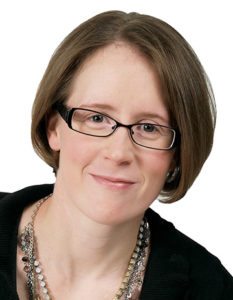
The Marine Retailers Association of the Americas has undergone a huge transformation in the last several years, improving its benefits, educational offerings and advocacy efforts.
The leadership of MRAA President Matt Gruhn (who we profiled in the 2012 Movers & Shakers) and Vice President Liz Walz has helped drive those changes, along with an active board of directors.
Anyone who talks to Walz will quickly realize she is passionate about education, whether it be at the annual Marine Dealer Conference & Expo produced by MRAA and Boating Industry or regular webinars and online education.
“In recent years, we’ve worked incredibly hard to expand not only the number of educational opportunities at MDCE, but also their depth, subject matter, presentation format and the takeaways attendees can bring back to their business to implement what they learn,” Walz said. “Here’s the rub: The MDCE takes place once a year. And while it offers a ton of ideas, tools, resources and best practices, training and education is most effective when it is a part of your company culture and your daily, weekly and monthly work life.”
That’s why MRAA has also focused on offering a range of educational resources throughout the year.
“[The] chance to help the industry get better through training and education is what gets me out of bed in the morning,” she said. “I believe in what our members sell – the boating lifestyle – and I believe in what they do to improve the lives of their employees, their customers and everyone in their communities. I want to help.”
The same philosophy has carried through to her own life and the daily operations of MRAA. Walz is currently enrolled in Spader Business Management’s Leadership Development Program, and she and other team members have taken other professional development courses.
In the end, the goal is to help members improve – to simply get better at what they do.
“The way we see it at MRAA, we work for our members,” Walz said. “So what makes us proud is contributing to their accomplishments, whether that’s helping them hire a new employee through our Career Center, improve their customer satisfaction through the Marine Industry Certified Dealer Program, or sell a new boat through one of our virtual training courses.”




